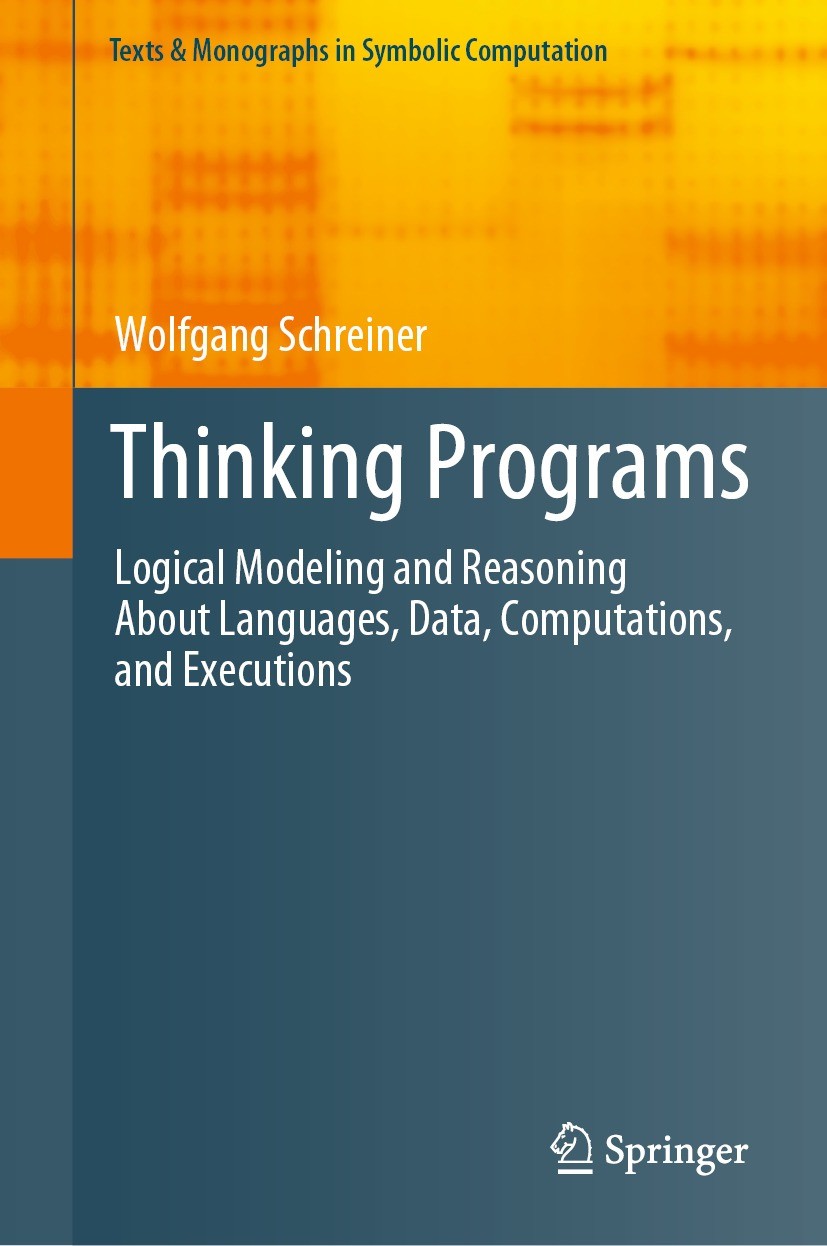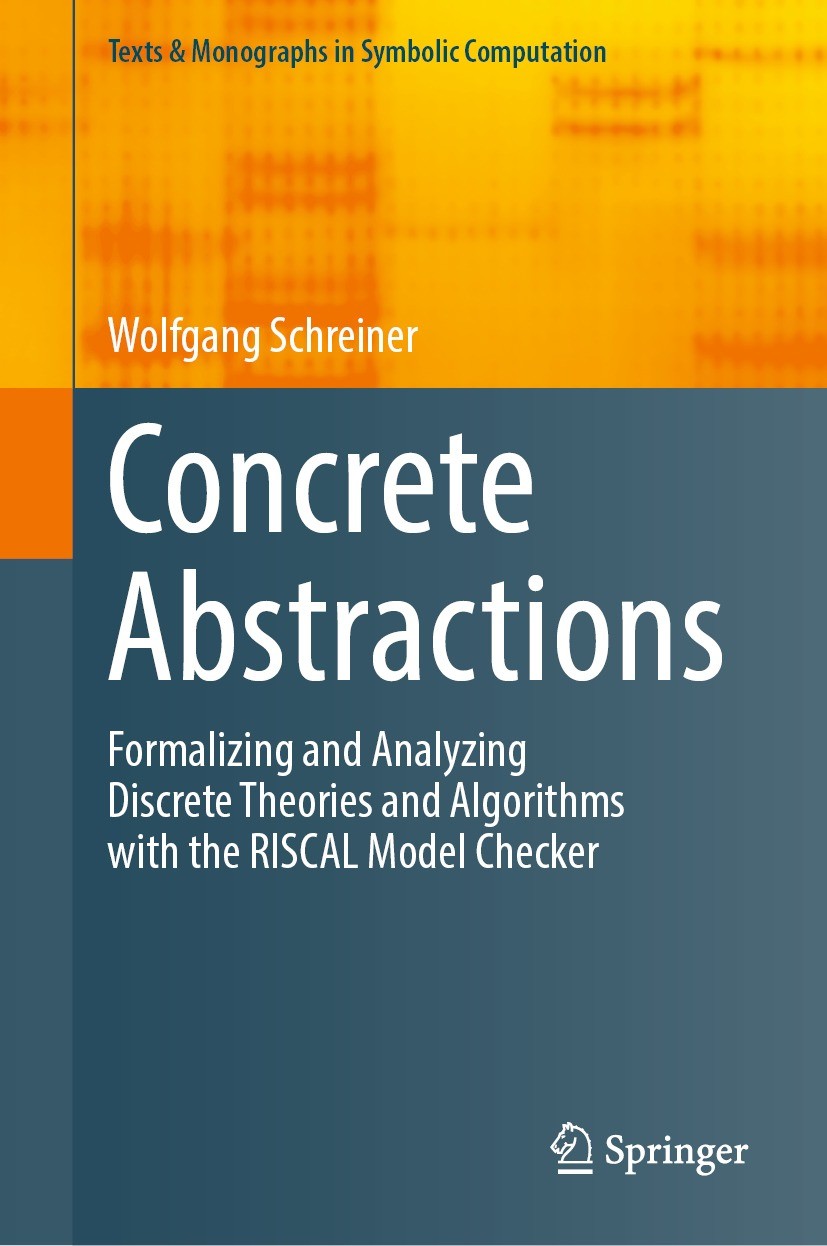
 |
| Exercises and Software |
 |
| RISCAL Software and Models |

A.Univ.Prof. Dipl.-Ing. Dr. Wolfgang Schreiner
Research Institute for Symbolic Computation (RISC)
Johannes Kepler University
A-4040 Linz, Austria, Europe
Tel: +43 732 2468 9963 Fax: +43 732 2468 9930
Email: Wolfgang.Schreiner@risc.jku.at [GPG Key]
Web: https://www.risc.jku.at/people/schreine
[Business Page at RISC]
_____________________________________________________________________
Curriculum Vitae (PDF)
__________________________________________________________________
A software for generating rapid prototype implementations of programming languages from their formal specifications.
A language and associated software system for connecting formal specification systems to theorem provers.
A language and associated software system for specifying and verifying mathematical algorithms.
LOGTECHEDU: Logic Technology for Computer Science Education (2018–2020)
I am a member of this JKU LIT project on the development of novel logic techniques for computer science education.
I am the JKU representative and coordinator of this project on the collaborative use of a massively parallel shared memory supercomputer.
EU Project PRACE 4-IP (2015–2018)
In the frame of this project, RISC (institute and company) jointly engage in high-performance software development and training and dissemination activities.
LogicGuard II (2014–2016)
This is a project on the efficient checking of time-quantified logic formulas with applications in computer security.
LogicGuard (2012–2013)
This is a project on the efficient checking of time-quantified logic formulas with applications in computer security.
EU Project PRACE 3-IP (2012–2016)
In the frame of this project, RISC (institute and company) jointly engage in high-performance software development and training and dissemination activities.
The RISC ProgramExplorer (2008–)
This is an attempt towards an interactive program reasoning environment.
DK W1214 Project “Formally Specified Computer Algebra Software” (2010-)
The goal of this project is the development of a formal framework and corresponding tools for the formal specification of computer algebra software.
The ”parallel” Command (2013)
A command line tool that reads an arbitrary number of command lines and executes them by a given number of processes in parallel.
A software for the solution of Elena Kartashova’s resonance conditions for 3- and 4-wave interactions.
The RISC ProofNavigator (2005–)
This is an attempt towards an interactive proof assistant as a first component of a future environment for formal system and program reasoning.
Austrian Grid 2 Project “Distributed Supercomputing in the Grid” (2007–2009)
The goal of this project is the development of a programming interface for running distributed applications on grid infrastructures.
EU Project EGEE-II (2006–2008)
The goal of the RISC participation in this project is to port the grid version of the SEE++ software for virtual eye surgery to the EGEE-II middleware.
A small tool for generating HTML-based presentations from templates (developed for producing training material in this project).
MathBroker II: Brokering Distributed Mathematical Services (2005–2007)
The goal of this project is to continue and extend the results of the previous MathBroker project on brokering mathematical services in the net.
Austrian Grid Project SEE-Grid (2004–2006)
The goal of this project is the development of a grid version of the software SEE++ for virtual eye surgery.
Brokering Distributed Mathematical Services (2001–2003)
The goal of this project is the development of a framework for brokering mathematical services that are distributed among networked servers. The foundation of this framework is a language for describing the mathematical problems solved by the services.
Distributed Maple (1998–)
Distributed Maple is a system for writing parallel programs in the computer algebra system Maple based on a communication and scheduling mechanism implemented in Java.
Integrating Temporal Specifications as Runtime Assertions into Parallel Debugging Tools (2001–2002)
This project pursues the integration of formal methods with tools for the debugging of parallel message passing programs. The idea is to generate from temporal logic specifications executable assertions that can be checked in the various states of parallel program execution.
Distributed Constraint Solving for Functional Logic Programming (1997–1999)
I am the technical leader of a research project on the development of a distributed constraint solving system based on a functional logic language.
DAJ is a toolkit for designing, implementing, testing, simulating, and visualizing distributed algorithms in Java.
High-Performance Generic Programming (1996–1998)
I direct a research project on the development of a generic compilation system based on a higher-order functor language that can be retargetted to multiple core languages.
COOPERATE (1998)
In the frame of the COOPERATE initiative, we are developing a component of a software system for the support of distributed meetings.
The RT++ Thread Package (1996)
This is a C++ package that provides higher-order threads in a type-safe framework with garbage collection.
The pD Compiler (1993–1994)
In my Ph.D. thesis I developed a compiler for a small para-functional programming language that used a new technique to generate parallelism from annotated functional programs. The target code is efficient PACLIB C code with explicit task creation and synchronization constructs.
The PACLIB Runtime Kernel (1992–1993)
Hoon Hong and I developed a parallel variant of the runtime kernel of the computer algebra library SACLIB. The parallel kernel supports on shared memory multiprocessors tasks as first order objects with garbage-collection, non-determinism, and lazy task creation.
Adam & Eve – An Abstract Dataflow Machine and Its Programming Language (1989–1990)
This was the title of my diploma thesis where I developed on a multi-transputer system a parallel simulator for a new kind of dataflow architecture,
Courses at the Johannes Kepler University Linz
Programming 2 (SS 2024, SS 2023, SS 2022, SS 2021, SS 2020, SS 2019, SS 2018, SS 2017, SS 2016, SS 2015, SS 2014, SS 2013, SS 2012, SS 2011, SS 2010, SS 2009, SS 2008, SS 2007, SS 2006, SS 2005, SS 2004, SS 2003, SS 2002).
Parallel Computing (SS 2024, SS 2023, SS 2022, SS 2021, SS 2020, SS 2019, SS 2018, SS 2017).
Introduction to Parallel and Distributed Computing (SS2024, SS2022, SS2020, SS2018, SS2016, SS2014, SS2012, SS2010, SS2008, WS2005, WS2003, WS2000, SS99, WS97, WS96, WS95, SS 94, SS 93, WS 92)
Formal Modeling (SS 2024, WS 2022, SS 2021, SS 2020, SS 2019).
Formal Specification of Abstract Data Types (SS 2024, SS 2022, SS 2020, SS 2018, SS 2016, SS 2014, SS 2012, SS 2010, SS 2008, WS 2005, WS 2002, WS 2000, WS 98).
Seminar Formal Methods and Automated Reasoning (SS 2024, WS 2023, SS 2023, WS 2022, SS 2022, WS 2021, SS 2021, WS 2020, SS 2020, WS 2019, SS 2019, WS 2018, SS 2018, WS 2017, SS 2017, WS 2016, SS 2016, WS 2015, SS 2015, WS 2014, SS 2014, WS 2013, SS 2013, WS 2012, SS 2012, WS 2011, SS 2011, WS 2010, SS 2010, WS 2009, SS 2009, WS 2008, SS 2008, WS 2007, SS 2007, WS 2006, SS 2006, WS 2005, SS 2005, WS 2004).
Formal Methods in Software Development (WS 2023, WS 2022, WS 2021, WS 2020, WS 2019, WS 2018, WS 2017, WS 2016, WS 2015, WS 2014, WS 2013, WS 2012, WS 2011, WS 2010, WS 2009, WS 2008, WS 2007, SS 2007, SS 2006, SS 2005).
Logic (WS 2023, WS 2022, WS 2021, WS 2020, WS 2019, WS 2018, WS 2017, WS 2016, WS 2015, WS 2014, WS 2013).
Formal Semantics of Programming Languages (SS 2023, SS 2021, SS 2019, SS 2017, SS 2015, SS 2013, SS 2011, SS 2009, WS 2006, WS 2004, SS 2001, SS 99, WS 97/98, WS 95/96, SS 91).
Formal Models for Parallel and Distributed Systems (SS 2023, SS 2021, SS 2019, SS 2017, SS 2015, SS 2013, SS 2011, SS 2009, WS 2006, SS 2001, WS 99, SS 98, SS 96).
Computability and Complexity (WS 2020, WS 2019, WS 2018, WS 2017, WS 2016, WS 2015, WS 2014, WS 2013, WS 2012, WS 2011, WS 2010, WS 2009, WS 2008, WS 2007, WS 2006).
Algebraic and Discrete Methods in Biology (SS 2009, SS 2008, SS 2007).
Algorithms for Distributed Systems (WS 2004, WS 2001, SS 2000, WS 98/99).
Project Seminar Parallel and Distributed Software and Algorithms (WS 2003, SS 2003, WS 2002, SS 2002, WS 2001, SS 2001, WS 2000, SS 2000, WS 99, SS 99, WS 98, SS 98)
Formal Semantics of Type and Module Systems (SS 2000, SS 98, SS 96)
Programming Projects
Parallel Programming Laboratory (SS 97, SS 95, SS 92)
Compilation of Functional Languages for Parallel Execution (SS 97, WS 93, WS 91)
Parallel Functional and Logic Programming (SS 93, WS 91)
Parallel Architectures for Declarative Languages (WS 90)
Courses at the Campus Hagenberg of the Upper Austria University of Applied Sciences
Introduction to Programming (Degree Programme “Communication, Knowledge, Media” respectively “Engineering for Computer-based Learning”, Hagenberg University of Applied Sciences, WS 2023, WS 2022, WS 2021, WS 2020, WS 2019, WS 2018, WS 2017, WS 2016, WS 2015, WS 2014, WS 2013, WS 2012, WS 2011, WS 2010 WS 2009, WS 2008, WS 2007, WS 2006, WS 2005, WS 2004, WS 2003, WS 2002, WS 2001).
Object-Oriented Programming (Degree Programme “Communication, Knowledge, Media” respectively “Engineering for Computer-based Learning”, Hagenberg University of Applied Sciences, SS 2024, SS 2023, SS 2022, SS 2021, SS 2020, SS 2019, SS 2018, SS 2017, SS 2016, SS 2015, SS 2014, SS 2013, SS 2012, SS 2011, SS 2010, SS 2009, SS 2008, SS 2007, SS 2006, SS 2005, SS 2004, SS 2003, SS 2002).
Mathematics 1 (Formal Problem Solving) (Degree Programme “Engineering for Computer-based Learning”, Hagenberg University of Applied Sciences, WS 2004, WS 2003, WS 2002, WS 2001).
Seminar “Scientific Writing” (Degree Programme “Engineering for Computer-based Learning”, Hagenberg University of Applied Sciences, SS 2004).
Mathematics 2 (Formal Problem Solving) (Formal Problem Solving) (Degree Programme “Engineering for Computer-based Learning”, Hagenberg University of Applied Sciences, SS 20004, SS 2003, SS 2002).
Networks 1 (Degree Programme “Engineering for Computer-based Learning”, Hagenberg University of Applied Sciences, WS 2003, WS 2002, WS 2001).
Networks 2 (Degree Programme “Engineering for Computer-based Learning”, Hagenberg University of Applied Sciences, SS 2002).
Distributed Computing (Degree Programme “Software Engineering”, Hagenberg University of Applied Sciences, SS 2000).
Formal Methods for Concurrent Systems (University of Debrecen, Debrecen, Hungary (February 2012, February 2011, September 2009, September 2007).
Ágoston Sütő (Master’s Thesis)
Joachim Borya (Bachelor Thesis)
Lucas Payr (Master’s Thesis)
Franz-Xaver Reichl (Master’s Thesis)
Hsuan-Ming-Chen (Universal Computing and Business Master’s Thesis)
Stefan Amberger (Master’s Thesis, joint supervision with Peter Paule and Volker Strumpen)
Lucas Payr (Bachelor Thesis)
Ramez Elbaroudy (Universal Computing and Business Master’s Thesis)
Alexander Brunhuemer (Bachelor Thesis)
Daniela Ritirc (Master’s Thesis).
Andrei-Ovidiu Coman (ISI-Hagenberg Master’s Thesis)
Ahmad Mohamed Hisham Ismail (ISI-Hagenberg Master’s Thesis)
Amira Zaki (ISI-Hagenberg Master’s Thesis)
Stefan Georgiev (ISI-Hagenberg Master’s Thesis)
Katharina Bauer-Öppinger (FH diploma thesis)
Fabian Schwaiger (FH diploma thesis)
Imre Matko (ISI-Hagenberg Master’s Thesis)
Kenji Miyamoto (ISI-Hagenberg Master’s Thesis)
Johannes Watzl (Master thesis)
Markus Stadlbauer (Master thesis)
Florian Prieler (FH diploma thesis)
Kathrin Furtlehner (FH diploma thesis)
Roswitha Wallner (FH diploma thesis)
Bettina Wansch (FH diploma thesis)
David Schwingenschlögl (FH diploma thesis)
David Wojak (FH diploma thesis)
David Hauger (FH diploma thesis)
Mirjam Köck (FH diploma thesis)
Günter Krausgruber (FH diploma thesis)
Gerald Eckerstorfer (FH Diploma Thesis)
Susanne Fest (FH Diploma Thesis)
Mircea Marin (Research Project and PhD. thesis).